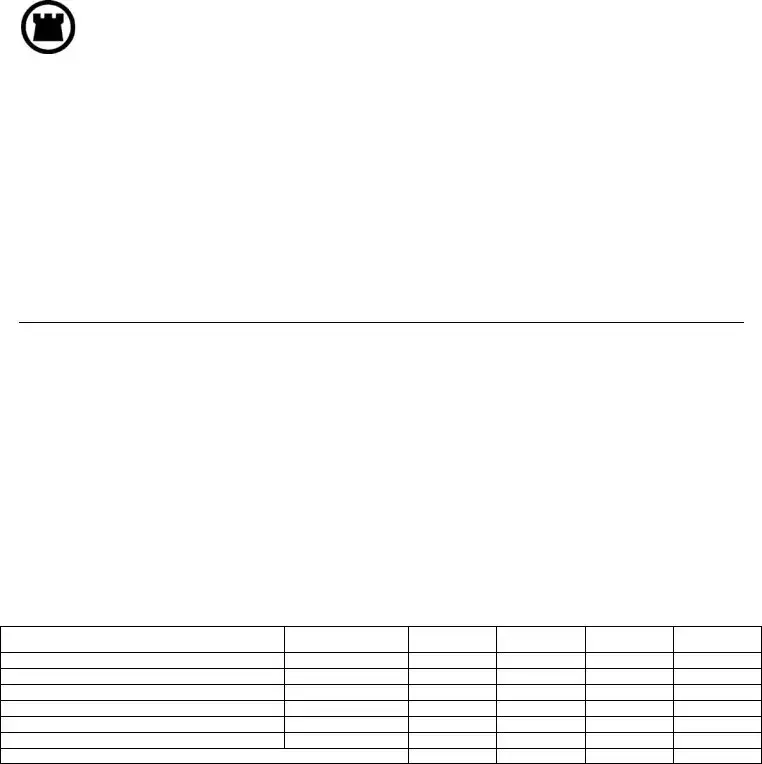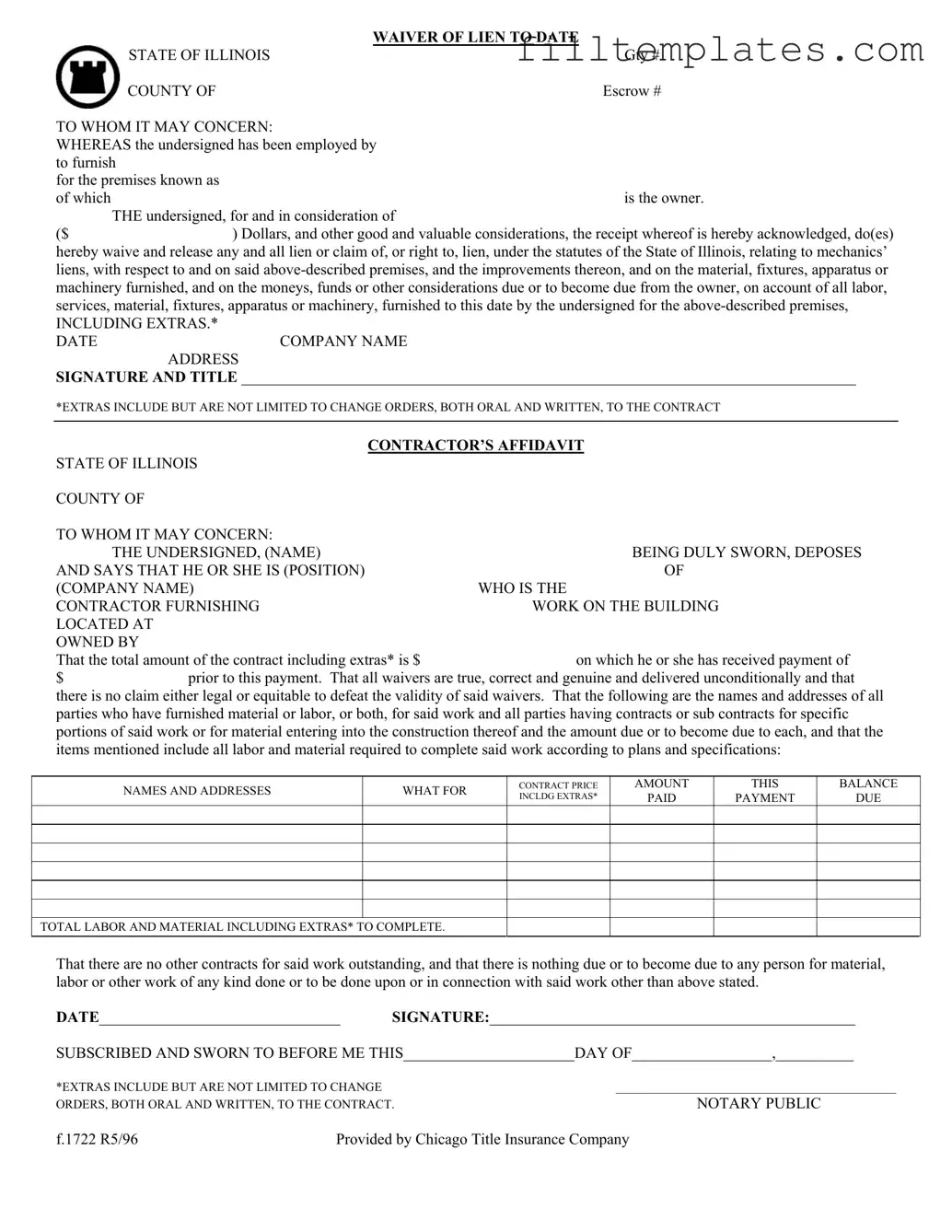Download Chicago Title Waiver Format Template
The Chicago Title Waiver Format form serves as a crucial document in real estate transactions, particularly in the context of construction and renovation projects. This form is designed to protect property owners from potential mechanics' liens that may arise from unpaid labor or materials supplied during the construction process. By completing this waiver, contractors and subcontractors acknowledge receipt of payment and agree to relinquish any claims they might have against the property for work performed up to a specified date. The form includes essential details such as the names of the parties involved, the contract amount, and any extras that may have been agreed upon. It also requires a sworn affidavit from the contractor, affirming that all waivers are genuine and that there are no outstanding claims against the property. This dual-layered approach not only provides transparency but also ensures that all parties are protected from future disputes regarding payment. Understanding the components and implications of the Chicago Title Waiver Format form is vital for anyone involved in real estate transactions in Illinois, as it plays a significant role in safeguarding both financial interests and property rights.
Key takeaways
When dealing with the Chicago Title Waiver Format form, understanding its components and implications is crucial. Here are some key takeaways to keep in mind:
- Purpose of the Waiver: This form serves to waive any lien rights under Illinois law, ensuring that contractors and subcontractors cannot place a lien on the property for unpaid services or materials.
- Clear Identification: Fill in the company name, the date, and the specific property details accurately. This clarity helps avoid any disputes later on.
- Consideration Amount: Specify the dollar amount being acknowledged as payment. This is essential for validating the waiver.
- Inclusion of Extras: The term "extras" refers to any additional work or changes not included in the original contract. Be sure to list these accurately.
- Signature Requirement: The form must be signed by the contractor or authorized representative. Without a signature, the waiver holds no legal weight.
- Affidavit Section: The affidavit part of the form requires the contractor to affirm that all information provided is accurate and complete, reinforcing the waiver's validity.
- Disclosure of Payments: Clearly outline all payments received and any balances due. This transparency is key in avoiding future claims.
- Notary Requirement: The completed form must be notarized. This step adds an extra layer of authenticity and can be critical in legal situations.
- Legal Compliance: Ensure that the form complies with Illinois statutes regarding mechanics’ liens. Non-compliance could invalidate the waiver.
- Record Keeping: Keep a copy of the signed and notarized waiver for your records. This documentation can be vital in case of disputes.
By following these key points, you can effectively navigate the Chicago Title Waiver Format form and protect your interests in property transactions.
Guide to Writing Chicago Title Waiver Format
Completing the Chicago Title Waiver Format form is an important step in ensuring that all parties involved in a construction project are protected from potential claims related to unpaid labor or materials. This form helps to document that certain rights have been waived, which can help facilitate the payment process. Below are the steps to accurately fill out the form.
- Company Name: Write the name of the company that is waiving the lien at the top of the form.
- Date: Enter the date on which the waiver is being executed.
- State and County: Fill in the state (Illinois) and the county where the property is located.
- Escrow Number: Include the relevant escrow number if applicable.
- To Whom It May Concern: Address the waiver to the relevant party or parties involved in the transaction.
- Premises Information: Specify the address of the property for which the waiver is being issued.
- Owner's Name: Identify the owner of the property.
- Consideration Amount: State the dollar amount being received in exchange for the waiver.
- Signature and Title: The undersigned must sign and provide their title, confirming their authority to execute the waiver.
- Extras: Note that extras include change orders, both oral and written, to the contract.
- Contractor's Affidavit Section: Fill in the contractor's name, position, and company name.
- Building Location: Specify the address of the building where the work is being performed.
- Contract Amount: Indicate the total contract amount, including any extras.
- Payment Received: State the amount that has been received prior to this payment.
- Names and Addresses: List all parties who have furnished material or labor, along with what they provided and the amounts due.
- Date: Write the date of the affidavit.
- Signature: The contractor must sign the affidavit.
- Notary Section: Leave space for the notary public to sign and date the document.
Browse Other PDFs
Dekalb County Water Application Online - Utilize the online form to apply for water service efficiently.
To create a comprehensive record of the transaction, many individuals turn to online resources for assistance, such as smarttemplates.net, which offers fillable templates that simplify the process of drafting a Texas Motorcycle Bill of Sale.
Why Do Court Cases Keep Getting Continued - Commonly utilized in unexpected circumstances.
Form Preview Example

WAIVER OF LIEN TO DATE |
|
S STATE OF ILLINOIS |
Gty # |
COUNTY OF |
Escrow # |
TO WHOM IT MAY CONCERN: |
|
WHEREAS the undersigned has been employed by |
|
to furnish |
|
for the premises known as |
|
of which |
is the owner. |
THE undersigned, for and in consideration of
($) Dollars, and other good and valuable considerations, the receipt whereof is hereby acknowledged, do(es) hereby waive and release any and all lien or claim of, or right to, lien, under the statutes of the State of Illinois, relating to mechanics’ liens, with respect to and on said
INCLUDING EXTRAS.* DATE
ADDRESS
SIGNATURE AND TITLE _______________________________________________________________________________
*EXTRAS INCLUDE BUT ARE NOT LIMITED TO CHANGE ORDERS, BOTH ORAL AND WRITTEN, TO THE CONTRACT
CONTRACTOR’S AFFIDAVIT
STATE OF ILLINOIS
COUNTY OF |
|
TO WHOM IT MAY CONCERN: |
|
THE UNDERSIGNED, (NAME) |
BEING DULY SWORN, DEPOSES |
AND SAYS THAT HE OR SHE IS (POSITION) |
OF |
(COMPANY NAME) |
WHO IS THE |
CONTRACTOR FURNISHING |
WORK ON THE BUILDING |
LOCATED AT |
|
OWNED BY |
|
That the total amount of the contract including extras* is $ |
on which he or she has received payment of |
$prior to this payment. That all waivers are true, correct and genuine and delivered unconditionally and that there is no claim either legal or equitable to defeat the validity of said waivers. That the following are the names and addresses of all parties who have furnished material or labor, or both, for said work and all parties having contracts or sub contracts for specific portions of said work or for material entering into the construction thereof and the amount due or to become due to each, and that the items mentioned include all labor and material required to complete said work according to plans and specifications:
NAMES AND ADDRESSES
WHAT FOR
CONTRACT PRICE INCLDG EXTRAS*
AMOUNT
PAID
THIS
PAYMENT
BALANCE
DUE
TOTAL LABOR AND MATERIAL INCLUDING EXTRAS* TO COMPLETE.
That there are no other contracts for said work outstanding, and that there is nothing due or to become due to any person for material, labor or other work of any kind done or to be done upon or in connection with said work other than above stated.
DATE_______________________________ |
SIGNATURE:_______________________________________________ |
||
SUBSCRIBED AND SWORN TO BEFORE ME THIS______________________DAY OF__________________,__________ |
|||
*EXTRAS INCLUDE BUT ARE NOT LIMITED TO CHANGE |
|
_____________________________________________ |
|
ORDERS, BOTH ORAL AND WRITTEN, TO THE CONTRACT. |
NOTARY PUBLIC |
||
f.1722 R5/96 |
Provided by Chicago Title Insurance Company |
||
Documents used along the form
The Chicago Title Waiver Format form is a crucial document in real estate transactions, particularly in Illinois. It helps ensure that contractors and suppliers waive their lien rights, protecting property owners from potential claims. Alongside this form, several other documents are commonly used to streamline the process and provide clarity. Here’s a brief overview of those documents.
- Contractor’s Affidavit: This document is sworn by the contractor, confirming the total contract amount and detailing payments received. It also lists all parties involved in providing labor or materials, ensuring that no claims are outstanding.
- Lien Waiver: A general lien waiver is used to confirm that a contractor or supplier has been paid for their work. It protects the property owner from future claims by acknowledging that the payment satisfies the contractor's rights to file a lien.
- Change Order: This document outlines any modifications to the original contract, including changes in scope, pricing, or timelines. It is essential for documenting agreed-upon alterations to the work being performed.
- California Motorcycle Bill of Sale: This essential document is vital for proving ownership transfer in a motorcycle sale. For more information on this form, visit toptemplates.info/bill-of-sale/motorcycle-bill-of-sale/california-motorcycle-bill-of-sale.
- Payment Application: This form is submitted by contractors to request payment for work completed. It details the work done, materials used, and the amount being billed, ensuring transparency in the payment process.
- Final Release of Lien: At the end of a project, this document confirms that all payments have been made, and the contractor waives any future lien rights. It provides peace of mind to property owners that no further claims will arise.
Using these documents in conjunction with the Chicago Title Waiver Format form helps create a smoother transaction process. Each plays a vital role in protecting the interests of all parties involved, ensuring clarity and security in real estate dealings.
